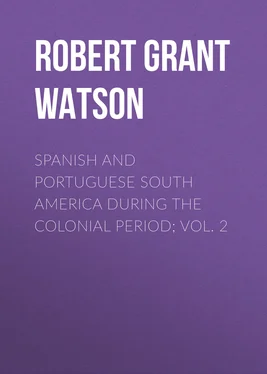Robert Grant Watson - Spanish and Portuguese South America during the Colonial Period; Vol. 2
Здесь есть возможность читать онлайн «Robert Grant Watson - Spanish and Portuguese South America during the Colonial Period; Vol. 2» — ознакомительный отрывок электронной книги совершенно бесплатно, а после прочтения отрывка купить полную версию. В некоторых случаях можно слушать аудио, скачать через торрент в формате fb2 и присутствует краткое содержание. Жанр: foreign_prose, История, foreign_edu, foreign_antique, на английском языке. Описание произведения, (предисловие) а так же отзывы посетителей доступны на портале библиотеки ЛибКат.
- Название:Spanish and Portuguese South America during the Colonial Period; Vol. 2
- Автор:
- Жанр:
- Год:неизвестен
- ISBN:нет данных
- Рейтинг книги:3 / 5. Голосов: 1
-
Избранное:Добавить в избранное
- Отзывы:
-
Ваша оценка:
- 60
- 1
- 2
- 3
- 4
- 5
Spanish and Portuguese South America during the Colonial Period; Vol. 2: краткое содержание, описание и аннотация
Предлагаем к чтению аннотацию, описание, краткое содержание или предисловие (зависит от того, что написал сам автор книги «Spanish and Portuguese South America during the Colonial Period; Vol. 2»). Если вы не нашли необходимую информацию о книге — напишите в комментариях, мы постараемся отыскать её.
Spanish and Portuguese South America during the Colonial Period; Vol. 2 — читать онлайн ознакомительный отрывок
Ниже представлен текст книги, разбитый по страницам. Система сохранения места последней прочитанной страницы, позволяет с удобством читать онлайн бесплатно книгу «Spanish and Portuguese South America during the Colonial Period; Vol. 2», без необходимости каждый раз заново искать на чём Вы остановились. Поставьте закладку, и сможете в любой момент перейти на страницу, на которой закончили чтение.
Интервал:
Закладка:
The Portuguese governor had retreated to Recife , which place, however, he had now not sufficient men to defend. As there was no hope of preserving it, he set fire to the ships and warehouses, which contained much valuable property; and there remained only for the invaders to reduce the two forts of St. Francisco and St. George , which commanded the entrance to the harbour. Five days were suffered to elapse before the latter was attacked. It was defended by Vieira and a band of young men who had volunteered with him, with a courage and pertinacity which formed a bright contrast to the confusion and pusillanimity displayed by their countrymen. The two forts, however, could not hold out long, and the Dutch fleet entered the harbour in triumph. Their hold upon Pernambuco was still further confirmed by the arrival, nine days later, of another fleet with reinforcements.
When the fugitive inhabitants of Olinda , relieved from the actual presence of the invader, found themselves unpursued in the country, they began to collect their reason and to recover their composure. Their general now pointed out to them that the object of the Dutch was gain rather than glory; that they coveted the sugar and tobacco which Pernambuco could produce, and that the surest way to frustrate their plans was to prevent them from cultivating these articles. Works were accordingly begun at a distance of three miles from Olinda and Recife , and were prosecuted with the utmost alacrity by the population in general, whilst four pieces of cannon were procured from the wreck of a Dutch ship. Indeed such was the speed with which the camp was constructed that it was already in a state of defence when the knowledge of its existence first came to the ears of the invaders; and an attempt to gain it by surprise was frustrated by the vigilance of Mathias de Albuquerque. On this occasion the Dutch fled, leaving forty slain.
Emboldened by this success, the Portuguese now assumed the offensive and laid an ambush for the Dutch general, who with six hundred men was proceeding from Recife to Olinda . He was taken by surprise, and owed his safety to the flight of his horse. The danger of passing from one of these towns to the other was so considerable, and afforded so good an opportunity for Portuguese attack, that it gave rise amongst these to the enrolment of a force who from the nature of their duties were called bush-rangers. They consisted, for the most part, of peasants, who came to the camp when they could spare time from their proper occupations. These men, who were only occasional visitors to the camp, were well off; but the fugitives from Olinda , some fifteen thousand in number, who dwelt at Bom Jesus , as the camp was called, suffered excessively from lack of provisions.
In the above respect the Dutch were no better off, for they could only hope for relief from the sea, whilst the only water to be found at Recife was collected from pits dug in the beach, and was scarcely fit for use. And although forests were before them, these were so well guarded by the Portuguese that their only fuel was that which they had brought with them. So pressing were the necessities of the Dutch, that the high prices which it was worth their while to offer were sure to tempt some of their mongrel opponents, three of whom were hanged by Mathias after having been detected in a forbidden traffic with the invader. The Dutch had nothing better to do but to endeavour to extend their conquests by sea. Their first expedition was against the island of Itamaraca , which contained twenty-three sugar-works, and was situated eight leagues to the south of Olinda . They did not succeed, however, in conquering it, and contented themselves with building a fort opposite the neighbouring shore commanding the entrance of a port. In Fort Orange they left eighty men with twelve guns before returning to Recife .
Whilst these events were passing, information of which was, of course, conveyed to the court of Madrid, that Government was not wholly idle. Nine vessels were despatched for the relief of the camp of Bom Jesus , some of which fell into the hands of the enemy’s cruisers, so that but little good resulted from their expedition. The inhabitants of the province of Pernambuco were on the whole left to defend their own interests, it being hoped that the harassing warfare which they were prosecuting would prove the best means of inducing the Dutch to withdraw from the country. When it appeared, however, that the Low Countries were fitting out a strong fleet to be sent to Pernambuco under the command of Admiral Hadrian Patry, who was to take out with him many Dutch families as settlers, the Fabian policy of the court of Madrid was no longer pursued. Again a fleet was equipped at Lisbon, the command of which was given to Don Antonio Oquendo. Of this force, which was ultimately to proceed to Spanish America, ten vessels, with one thousand men and twelve pieces of cannon, were destined for Pernambuco .
The fleet which sailed under Oquendo’s flag, besides the ten vessels with troops for Pernambuco , consisted of twenty ships of war; whilst four-and-twenty merchantmen, laden with sugar, joined him for the sake of his convoy at Bahia , at which port he had been instructed to call. This latter instruction gave the Dutch admiral time to reach Recife ; and, having landed his troops, he sailed out again, with sixteen ships, in quest of the enemy. When the fleets came in sight of one another Oquendo ordered his transports and merchant vessels to fall to leeward. His own ship then engaged in a desperate struggle with that of his opponent, whose vessel it grappled. Ere long the Dutch vessel was on fire, and that of Oquendo narrowly escaped the same fate. It was, however, towed away in time. The renowned admiral Patry, disdaining to attempt to save his life, determined at least to preserve his colours from falling into the hands of the enemy, and plunged with them into the sea. In this fierce action, which was splendidly fought on both sides, about three thousand men fell, the loss being pretty equally distributed. On the morrow, Oquendo, having given orders to the Count of Bagnuolo to take the succours into Pernambuco , proceeded on his way to the Spanish Main to convoy the homeward-bound galleons.
Bagnuolo gained the port of Barra Grande , thirty leagues from the camp of Bom Jesus . The troops were safely landed, and after a difficult march joined Mathias de Albuquerque. The Dutch commander, knowing that the Portuguese had received reinforcements, thought it necessary to concentrate his troops at Recife , upon which he set fire to Olinda , the entire city being consumed. But it was not long before the Dutch discovered the impolicy of this latter measure, for, being concentrated at Recife , the whole Portuguese force was brought to bear on that one point. In order to make a diversion, three thousand men were despatched to attack Paraïba . This place was defended by a fort which commanded the bar, and the Dutch therefore determined to attack by land rather than to enter the river. There was some severe fighting; but Paraïba being reinforced from the camp, the invaders were at length constrained to retire, leaving their stores behind them. The next attempt of the Dutch was upon Rio Grande , at the entrance of the river Potengi ; but here too they were unsuccessful.
Whilst Olinda remained closed, the trade between the province of Pernambuco and Portugal passed for the most part through a port, about seven leagues to the north of Recife , called Pontal de Nazareth , so named from a celebrated church on a mountain, possessing a miracle-working image of the Virgin. It was fortified with four guns, and had a garrison of nearly two hundred men. On this place the Dutch directed their next attempt; but, not liking its appearance, they coasted along, meaning to land in a creek some distance beyond. It so happened that they were received by a sharp fire from a party of soldiers who were escorting some treasure, and whose numbers were concealed by the thicket. Thinking that a strong party had been sent thither from Nazareth , the Dutch commander now doubled back on that place. He was, however, mistaken, and his attack on it was repulsed with a loss of seventy men.
Читать дальшеИнтервал:
Закладка:
Похожие книги на «Spanish and Portuguese South America during the Colonial Period; Vol. 2»
Представляем Вашему вниманию похожие книги на «Spanish and Portuguese South America during the Colonial Period; Vol. 2» списком для выбора. Мы отобрали схожую по названию и смыслу литературу в надежде предоставить читателям больше вариантов отыскать новые, интересные, ещё непрочитанные произведения.
Обсуждение, отзывы о книге «Spanish and Portuguese South America during the Colonial Period; Vol. 2» и просто собственные мнения читателей. Оставьте ваши комментарии, напишите, что Вы думаете о произведении, его смысле или главных героях. Укажите что конкретно понравилось, а что нет, и почему Вы так считаете.












